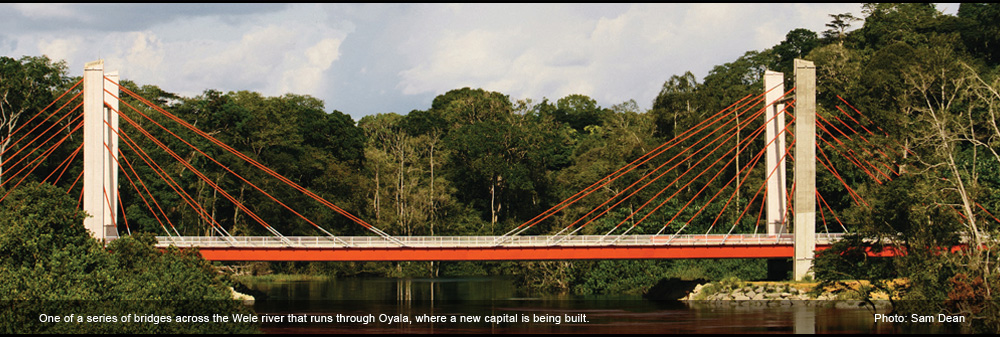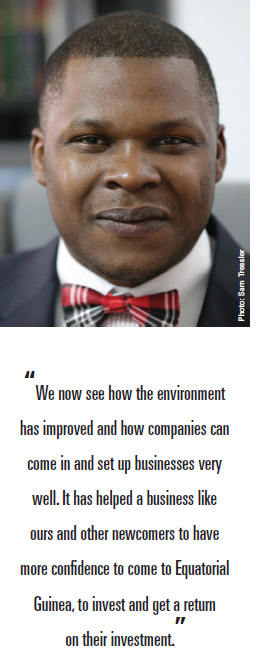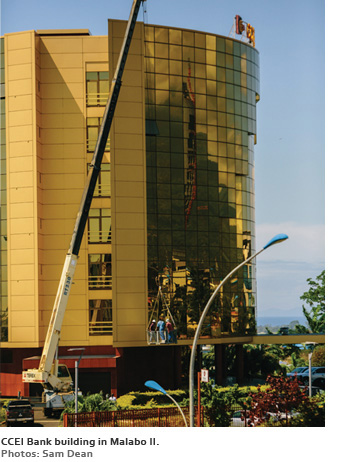

But he is not just someone who can help you navigate the laws and regulations of Equatorial Guinea; rather he offers a deep understanding of government thinking and strategy, and of what his country needs and is looking for. He can provide that all-important bridge between public sector institutions and private sector companies. He originally worked for the United Nations, and later a bank and an oil company, but then decided to return to his homeland. In 2009 he established Centurion LLP, a firm with just two lawyers. Today his firm has grown to 35 lawyers, and is the largest in the Central Africa region. In addition to its base in Malabo, Centurion has offices in Ghana and Cameroon, liaison offices in Houston and Toronto, and an affiliate in Greenbelt, Maryland. For English speakers, Centurion provides a welcome oasis of mother-tongue users, as English is the language of the practice. According to Lawyers.com, his clients give him a score of 5 out of 5. No surprise then that his services are frequently sought out by major investors, especially in the oil and gas industries, but also by government leaders. He recently sat down with Vistas at his office in the Caracolas district of Malabo to discuss his personal view of his homeland, the investment climate in Equatorial Guinea, the macro-economic picture and the progress being made under the Horizon 2020 plan. Below follow some of his comments. Centurion LLP As a lawyer, looking at the influx of US investments and at the services and issues these American companies and international businesses would need, we saw a market and decided to organize and build up Centurion to represent these firms. We also decided to improve the legal framework in the country by working with various nationals, by training them and ensuring that they learned what I saw--having gone through graduate business school and law school in the United States. This development process would allow me to come back here and build a new generation for what the President has been trying to do with Horizon 2020. Training a new generation of lawyers
We definitely have a more collaborative effort from government officials. All restrictions, all waivers have been put aside. It has been a concerted consultation. We now see how the environment has improved and how companies can come in and set up businesses very well. It has helped a business like ours and other newcomers to have more confidence to come to Equatorial Guinea, to invest and get a return on their investment. I’ve seen a lot of improvement in the last five years. The legal framework for doing business The government respected their contracts [with these companies] and that is something that has to be supremely valued. I think that has been the basis that spurred a lot of development and engagement. The [government] contracts have been sacrosanct in Equatorial Guinea, and that has continued to improve. That is the basis of any strong development that will keep the vision of Horizon 2020 going, allow companies to complete their projects, and attract new investors. This is fundamental to matching the President’s ambition for diversifying the economy, from oil to agriculture, tourism, fishing, and industry. You have to look at favorable packages: tax incentives and tax exemptions that will truly offer an incentive for investors to come here. The first phase of Horizon 2020 Small businesses will particularly benefit from this harmonization. It gives everybody a chance, a clear, succinct way to operate and invest here. As a lawyer, I see this as an important step – perhaps the most important in the first phase of Horizon 2020 – passing harmonized business laws for commercial transactions and arbitration tribunals that provide for businesses to launch here and have an open way to conduct business. These laws produce a strong judiciary for small businesses to have a uniform, standard mechanism for doing business and to invest. This clarity takes us to the next level to have more businesses and freedom for them to participate. Corporate tax rates I think you should have a targeted tax plan. You could still keep the 35 percent tax on the hydrocarbon sector, which is the most profitable. However, the government could provide tax incentives, since it is going to diversify the economy. You provide incentives to industry--agriculture for example--with tax breaks, or lower tax brackets. But in the profitable energy sector there is no need to lower these assessments. Local ownership The 35 percent is reserved for nationals to participate in a level playing field with the foreign companies. Many of the foreign companies are branches [of the main corporation and not an independent entity in Equatorial Guinea]. Equatorial Guinea is changing, and to enable its citizens to participate financially is fair for an emerging country. It’s part of our long-term development. The issue of visas for non-US citizens The process is continually being reviewed and improved. My biggest worry is that the administration and security agencies need a lot of support, so that people who want to come in to work can do so without having to wait. “We now see how the environment has improved and how companies can come in and set up businesses very well. It has helped a business like ours and other newcomers to have more confidence to come to Equatorial Guinea, to invest and get a return on their investment.” That issue continues to be improved. But people have to realize that they need all the right documents to secure their permits and visas. I cannot walk into the US Embassy and expect to get a visa unless I have all the right papers in order. The same is true for Great Britain. For us to go there, we have to go to Ghana [there is no British Embassy in Equatorial Guinea], and it takes one or two weeks. The business community and diplomats have to work together to improve this process. Opportunities for investors I think you still have to look at energy because that is tried, tested and true. The results have been very good. But the manufacturing sector is coming along, and the banking sector is another one Americans should look to. Banking and financial services are going to see a big boom. American and foreign businesses can help build this sector. The government is interested in empowering this sector also. The oil-backed economy will have a need for private equity funds; investors will find reforms being worked on by the government for taxes and financial instruments. These incentives should be welcome to investors. The government really does want to work with investors in these areas. Special investment zone at Mbini There is a special investment zone at Mbini, a huge industrial area. The government is going to carry out massive investments in this area to [diversify] the economy. The government is always looking to see if it is doing enough to provide an enabling environment, where investors can build and flourish. Equatorial Guinea in 2020 Also important is the great impact of going forward in education. Really, thanks to the Americans and oil company heads like John Hess, together with the President, the impact on education and training people represents the future of Equatorial Guinea. All our gains will only be sustainable if you have a well-educated, trained people to secure the gains and to move forward more boldly to be a more innovative and creative people. A program supported by Hess, implemented by AED, has trained some 1,000 teachers and trainers. Hess has committed a lot of funds and topnotch American advisers and trainers to this program. It has been one of the quiet, little-known success stories here in recent years. Why not have a future superman from Bioko Island or elsewhere here? That is what people will see in 2020: young people of a new generation, more creative, innovative, and exercising a greater sense of their patriotism for Equatorial Guinea. |
MALABO GUIDE
|
East West Communications ©

 Evolution in the business climate
Evolution in the business climate